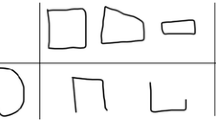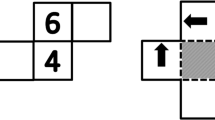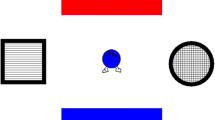Abstract
There is now much convincing evidence that the context in which children are given cognitive tasks can have a huge effect on their performance in those tasks, even when the experimental and control conditions make exactly the same logical and cognitive demands. According to this, we found that children faced with a cognitive-perceptual task (the Rey–Osterrieth's complex figure reproduction test) performed better or worse in one context (geometry) than in another (drawing), depending on their performance history in these contexts, although the task was the same in both conditions. These effects are discussed both in relation to underlying processes and in perspective with another phenomenon (stereotype threat) which also provides evidence for the social regulation of cognitive functioning in the school environment.
Similar content being viewed by others
References
Baron, Robert S. (1986). Distraction-conflict theory: Progress and problems. In L. Berkowitz (Ed.), Advances in experimental social psychology. New York: Academic Press, pp. 1–40.
Baumeister, Roy F. (1984). Choking under pressure: Self-consciousness and paradoxical effects on incentives on skillful performance. Journal of Personality and Social Psychology, 46, 610–620.
Bernstein, Basil (1971). Class, codes and control. London: Routledge.
Bourdieu, Pierre & Passeron, Jean-Claude (1964). Les héritiers (The heirs). Paris, Editions de Minuit.
Brunot, Sophie, Huguet, Pascal, & Monteil, Jean-Marc (2000). Performance feedback and selffocused attention in the classroom: When past and present interact. Social Psychology of Education, 3, 277–293.
Carraher, Terezinha Nunes, Carraher, David William, & Schliemann, Analucia Dias (1985). Mathematics in the streets and in the schools. British Journal of Developmental Psychology, 3, 21–29.
Chambon, Michel (1990). La représentation des disciplines scolaires par les parents d'élèves: Enjeux de valeurs, enjeux sociaux. Revue française de Pédagogie, 92, 31–40.
Croizet, Jean-Claude & Claire, Theresa (1998). Extending the concept of stereotype threat to social class: The intellectual underperformance of students from low socio-economic status. Personality and Social Psychology Bulletin, 24, 588–594.
Croizet, Jean-Claude, Désert, Michel, Dutrévis, Marion, & Leyens, Jacques-Philippe. Stereotype threat, social class, gender, and academic underachievement: When our reputation catches up to us and takes over. (this issue).
Deschamps, Jean-Claude, Lorenzi-Cioldi, Fabio, & Meyer, Gil (1982). L'échec scolaire: Elève modèle ou modèle d'élève? Approche psychosociologique de la division sociale à l'école. Lausanne: Pierre-Marcel Favre.
Donaldson, Margaret (1978). Children's minds. Glasgow: Fontana/Collins.
Easterbrook, J. A. (1959). The effect of emotion on cue utilization and the organization of behavior. Psychological Review, 66, 183–201.
Ellis, Henry C. & Ashbrook, PatriciaW. (1988). Resource allocation model of the effect of depressed mood states on memory. In K. Fielder & J. Forgas (Eds.), Affect, cognition and social behavior. Toronto: Hogrefe, pp. 25–43.
Ellis, Henry C. & Ashbrook, Patricia W. (1989). The ‘state’ of mood and memory research: A selective review. In D. Kuiken (Ed.), Mood and memory: Theory, research, and applications. (Special Issue). Journal of Social Behavior and Personality, 4, 1–21.
Greenberg, Jeff & Pyszczynski, Tom (1986). Persistent high self-focus after failure and low self-focus after success: The depressive self-focusing style. Journal of Personality and Social Psychology, 50, 1039–1044.
Guimond, Serge & Roussel, Lydie. Bragging about one's school grades: Gender stereotypic and students' perception of their abilities in science, mathematics, and language. (this issue).
Herrnstein, Richard J. & Murray, Charles A. (1994). The bell curve: Intelligence and class structure in American life. New York: Free Press.
Higgins, Tory E. (2000). Social cognition: Learning about what matters in the social world. European Journal of Social Psychology, 30, 3–39.
Huguet, Pascal (1992). Catégorisations, insertions sociales et performances cognitives: Approche expérimentale (Categorisations, social context and cognitive performances: An experimental approach). Thèse de doctorat nouveau régime, non publiée (unpublished thesis).
Huguet, Pascal, Charbonnier, Emmanuelle, & Monteil, Jean-Marc (1999). Productivity loss in performance groups: People who see themselves as average do not engage in social loafing. Group Dynamics: Theory, Research, and Practice, 3, 118–131.
Huguet, Pascal, Galvaing, Marie-Pierre, Dumas, Florence, & Monteil, Jean-Marc (2000). The social influence of automatic responding: Controlling the uncontrollable. In J. P. Forgas, K. D. Williams, & L. Wheeler (Eds.), The social mind: Cognitive and motivational aspects of interpersonal behavior (Vol. 2). Cambridge: Cambridge University Press, pp. 371–388.
Huguet, Pascal, Galvaing, Marie-Pierre, Monteil, Jean-Marc, & Dumas, Florence (1999). Social presence effects in the Stroop task: Further evidence for an attentional view of social facilitation. Journal of Personality and Social Psychology, 77, 1011–1025.
Huguet, Pascal, & Monteil, Jean-Marc (1992). Social comparison and cognitive performance: A descriptive approach in an academic context. European Journal of Psychology of Education, 7, 131–150.
Huguet, Pascal, & Monteil, Jean-Marc (1995). The influence of social comparison with less fortunate others on task performance: The role of gender motivations or appropriate norms. Sex Roles, 33, 753–765.
Katz, Irwin, Roberts, S. Oliver, & Robinson, James M. (1965). Effects of task difficulty, race of administrator, and instructions on digit-symbol performance of negroes. Journal of Personality and Social Psychology, 2, 53–59.
Levine, John M., Resnick, Lauren B., & Higgins, Tory E. (1993). Social foundations of cognition. Annual Review of Psychology, 44, 585–612.
Lovaglia, Michael J., Lucas, Jeffrey W., Houser, Jeffrey A., Thye, Shane R., & Markovsky, Barry (1998). Status processes and mental ability test scores. American Journal of Sociology, 104, 195–228.
Monteil, Jean-Marc (1988). Comparaison sociale. Stratégies individuelles et médiations sociocognitives. Un effet de différenciations comportementales dans le champ scolaire. European Journal of Psychology of Education, 3, 3–18.
Monteil, Jean-Marc (1991). Social regulations and individual cognitive functioning: Effects of individuation on cognitive performance. European Journal of Social Psychology, 21, 225–237.
Monteil, Jean-Marc (1993). Soi et le contexte. Paris: Armand Colin.
Monteil, Jean-Marc, Brunot, Sophie, & Huguet, Pascal (1996). Cognitive performance and attention in the classroom: An interaction between past and present academic experiences. Journal of Educational Psychology, 88, 242–248.
Monteil, Jean-Marc & Huguet, Pascal (1991). Insertion sociale, catégorisation sociale et activités cognitives. Psychologie Française, 36, 35–46.
Monteil, Jean-Marc & Huguet, Pascal (1999). Social context and cognitive performance: Towards a social psychology of cognition. Hove, East Sussex: Psychology Press.
Mugny, Gabriel & Carugati, Felice (1985). L'intelligence au pluriel. Cousset: DelVal.
Palfai, Tibor P. & Salovey, Peter (1992). The influence of affect on self-focused attention: Conceptual and methodological issues. Consciousness and Cognition, 1, 306–339.
Parker, Louise E. & Lepper, Mark R. (1992). Effects of fantasy contexts on children's learning and motivation: Making learning more fun. Journal of Personality and Social Psychology, 62, 625–633.
Pyszczynski, Tom & Greenberg, Jeff (1983). Determinants of reduction in intended effort as a strategy for coping with anticipated failure. Journal of Research in Personality, 17, 412–422.
Rey, Albert (1941). L'examen psychologique dans les cas d'encephalopathie traumatique (The psychological examination in cases of traumatic encephalopathy). Archives de psychologie, 28, 215–285.
Roazzi, Antonio & Bryant, Peter (1992). Social class, context and cognitive development. In P. Light & G. Butterworth (Eds.), Context and cognition. London: Harvester Wheatsheaf, pp. 14–27.
Sarason, Irwin G. (1972). Test anxiety and the model who fails. Journal of Personality and Social Psychology, 62, 410–413.
Sarason, Irwin G. (1984). Stress, anxiety, and cognitive interference: Reaction to tests. Journal of Personality and Social Psychology, 46, 929–938.
Seibert, Pennie S. & Ellis, Henry C. (1991). Irrelevant thoughts, emotional moods states and cognitive task performance. Memory and Cognition, 19, 507–553.
Spencer, Steven J., Steele, Claude M., & Quinn, Dianne M. (1999). Stereotype threat and women's math performance. Journal of experimental Social Psychology, 35, 4–28.
Steele, Claude M. & Aronson, Joshua (1995). Stereotype threat and the intellectual test performance of African Americans. Journal of Personality and Social Psychology, 69, 797–811.
Tombaugh, Tom N., Faulkner, Penny, & Hubley, Anita M. (1992). Effects of age on the Rey-Osterrieth and Taylor complex figures: Test-retest data using an intentional learning paradigm. Journal of Clinical and Experimental Neuropsychology, 14, 647–661.
Van Laar, Colette & Sidanius, Jim. Social status and the academic achievement gap: A social dominance perspective. (this issue).
Wine, Jeri (1971). Test anxiety and direction of attention. Psychological Bulletin, 76, 92–104.
Author information
Authors and Affiliations
Corresponding author
Rights and permissions
About this article
Cite this article
Huguet, P., Brunot, S. & Monteil, J.M. Geometry Versus Drawing: Changing the Meaning of the Task as a Means to Change Performance. Social Psychology of Education 4, 219–234 (2001). https://doi.org/10.1023/A:1011374700020
Issue Date:
DOI: https://doi.org/10.1023/A:1011374700020




